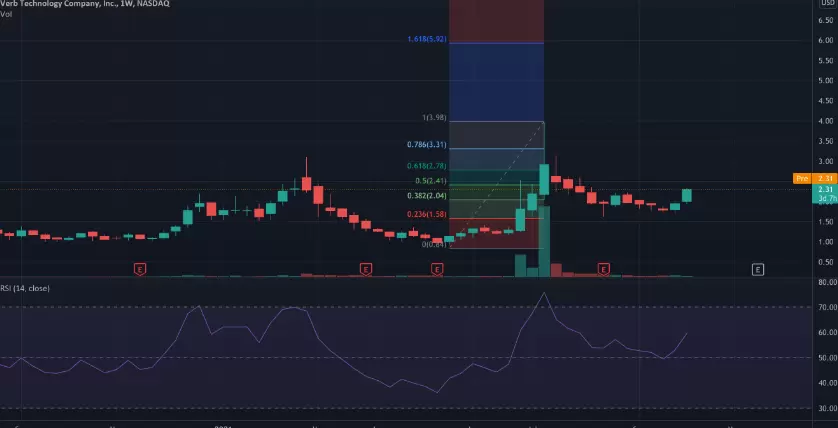Verb Technology Co. Inc. is an interactive video company that provides marketing, virtual events, and training applications. What started as a promising growth story fueled by pandemic disruption has now given way to major uncertainty.
In the deep dive, we’ll examine key reasons for Verb’s recent downturn and assess opportunities or risks that may shape its trajectory going forward.
The Rise and Precipitous Fall of VERB Technology Stock
Founded in 2014, Verb offers live streaming and video engagement tools through products like Verb Live and Verb CRM. Their solutions enable virtual presentations, conferences, training sessions and more.
Whilst COVID hit in 2020, lockdowns created remarkable calls for digital/hybrid occasions. Verb was quick to capitalize, gaining users as clients transitioned conferences online.
Early investors saw potential, bidding the stock from under $1 to over $2.50 by November 2021 as revenue grew.
Fortunes turned swiftly in 2022. Vaccine availability allowed the return of in person activity, shrinking Verb’s addressable market. Concurrently, user engagement metrics flagged according to tracking firms.
Quarterly results compounded worries Q1 sales fell 14% year over year while losses more than tripled.
As optimism gave way to uncertainty, VERB technology entered a nose dive. From its late 2021 high, the stock has since relinquished over 80% of its value. At one point dipping under $0.30, new 52 week lows were set.
While it has stabilized slightly, regaining lost ground will require proven ability to thrive outside pandemic conditions.
Dependence on Events Takes its Toll
Perhaps the starkest reality check has been Verb’s heavy reliance on the virtual/hybrid events segment. When COVID demand sparked rapid growth, the vertical comprised the lion’s share of sales. But events by nature can be unpredictable and prone to changing macro trends.
Without restrictions today, many clients opted to return conferences in person due to networking benefits. Furthermore, some assumed virtual adoption temporarily as an alternative, not a long term preference.
The dynamic served as a rude awakening for stakeholders counting on sustained online shifts.
It’s since become apparent just how “lumpy” the events space can be based on external factors beyond Verb’s control.
The withdrawal of the business in a short time frame hurt the top and bottom lines immensely. To restore faith, diversifying revenue sources beyond volatile segments rates as a top priority.
Initiatives to Broaden the Growth Runway
Verb’s leadership recognizes concentration risks and is pursuing multiple avenues to expand offerings. Some potential opportunities on the horizon include:
- Live Streaming sporting events into new international markets through NBA/WNBA partnerships
- Leveraging video shopping/live commerce capabilities as e commerce further penetrates retail
- Online education initiatives like virtual seminars, webinars and corporate training resources
- Bolstering tools for video agencies, publishers and other content creators
- Cross selling complementary livestream products from recent acquisitions
- Strategic mergers or buyouts adding technical capabilities and scale
Concrete updates on timelines, budgets or customer traction for these initiatives have so far been limited. Until pilots prove out, investors remain wary of placing conviction in hypothetical future strategies.
Can Verb Overcome Financial Headwinds?
Even with successful diversification, Verb’s balance sheet will likely determine its fate. As of Q1, it has just $5.7M cash on hand against $41M liabilities. Additionally, operating losses continue expanding, coming in at $9.4M last quarter versus $2.6M year prior.
To survive in the pre profitability stage, companies depend on access to capital. But raising funds entails high dilution or debt risks for shareholders given the precarious pricing environment. Verb is additionally constrained by its relatively small $35M market cap.
There is also a question of whether profits truly lie within reach, even assuming successful product market fit expansion. Significant operational expenditures will accompany growth strategies, adding pressure. Streamlining costs can buy time, though cuts come at the risk of hampering innovation initiatives.
Overall, Verb faces a classic catch 22: it needs more working capital to diversify, yet access depends on first mitigating financial pressures through top line growth. Navigating these challenges will test management’s strategic acumen in the extreme.
Final Considerations
While Verb has promising livestream technology and a determination to evolve, uncertainties currently abound.
The stock amounts to a high risk, high reward speculation play contingent on multiple moving pieces falling into place.
For those with an appetite, a partial speculative stake is defensible at VERB’s substantially discounted valuation. Any investment demands eyes wide open to persistent execution risks until profitability comes into view.
Patience from holders seems the wisest approach. A watchful waiting period is prudent before conclusions on long term viability.
Should Verb’s initiatives bear fruit while addressing financial concerns, confidence may return, but only time will reveal whether the company can truly succeed where pandemic disruptions subside.
FAQ
Q. Why is tech stock dropping?
A. High expenditures in AI without immediate revenue benefits.
Q. What does verb technology do?
A. Transforms how businesses attract and engage customers.
Q. What is the AI forecast for 2025?
A. $134.8 billion.
Q. Who is the verb owned by?
A. Moroccanoil.
Q. Is it time to buy stocks?
A. Now is as good a time as ever to buy stocks.
Conclusion
In conclusion, potential remains, but Verb’s fate hinges precariously on navigating challenges ahead through focused execution. More clarity is needed before investors can gauge if management’s ambitions can override present uncertainties surrounding the fallen growth stock looking to stage a turnaround.













